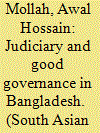| Srl | Item |
| 1 |
ID:
087532


|
|
|
|
|
| Publication |
2008.
|
| Summary/Abstract |
The terms 'governance' and 'good governance' are increasingly being used in development literature. Intellectuals, bureaucrats and civil society members alike are accepting the spirit of the concept and are conceiving it in the context of their own experience and environment. The Bangladeshi government has recently been under constant pressure from various donor agencies for ensuring good governance. The implementation and achievement of good governance depends upon the transparency, honesty and efficiency of the legislature, executive and judiciary, along with the cooperation of civil society and the private sector. The main concern of this article is to analyse the role of the judiciary in the pursuit of good governance in Bangladesh. The study will focus on the Bangladesh Supreme Court in order to evaluate its role in ensuring good governance.
|
|
|
|
|
|
|
|
|
|
|
|
|
|
|
|
| 2 |
ID:
174220


|
|
|
|
|
| Summary/Abstract |
The aim of this paper is to examine the trial process and standard of the International Crimes Tribunal (ICT) in Bangladesh. The main aim of the paper is to explore whether the trial is about justice or politics. Two International Crimes Tribunals (ICTs) have been established following the amended ICT Act 2009 after 40 years of independence. To date, more than 30 verdicts have been delivered by the tribunals and most of the accused have been proved to be war criminals, as collaborators with the Pakistani army, and involved in the politics of Jamaat who have penalized for capital punishment. Jammat is name of a political party in Bangladesh. Although the tribunal is named ‘the International Crimes Tribunal’, no international judges or prosecutors – like those who have taken part in the tribunals of Nuremberg, Tokyo, Rwanda, Yugoslavia or the permanent International Criminal Court of The Hague – have been involved in this trial process. The Pakistani military who were involved and accused as war criminals have also been excluded from prosecution. Therefore, a lot of criticisms have made about the trial process and standard; however, some unique features can be found, such as an appeal to the Supreme Court and a mercy petition to the President. It has also been proved that politics are involved in the war crimes and even the trial process, which is not influenced solely by the abstract notions of justice. The paper takes the form of a descriptive case study and is based on mainly secondary sources of information.
|
|
|
|
|
|
|
|
|
|
|
|
|
|
|
|